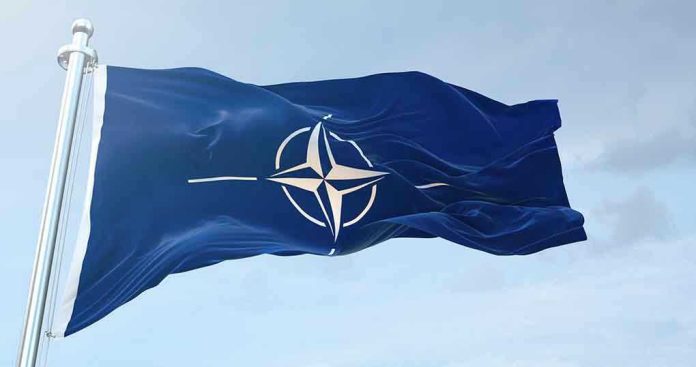
Trump’s call to expel Spain from NATO exposes just how far he’s willing to go to put American interests—and defense dollars—first, rattling globalists and European socialists alike.
Story Snapshot
- President Trump demands NATO allies meet a new 5% defense spending target, far outpacing historic commitments.
- Trump publicly singles out Spain for failing to hit this mark, suggesting the country be expelled from NATO.
- Spanish officials and opposition leaders swiftly reject the idea, citing NATO’s treaty, which allows only voluntary withdrawal, not expulsion.
- The incident highlights the growing rift between America-first leadership and European reliance on U.S. military power.
Trump’s Bold Stand on NATO Spending: Raising the Bar
At a White House press event on October 9, 2025, President Donald Trump demanded that NATO allies step up to a new benchmark: spending 5% of their GDP on defense. This figure is more than double the prior 2% guideline agreed upon at the 2014 Wales Summit. Trump’s insistence reflects deep-seated frustration among American taxpayers and conservatives, who see the U.S. carrying the lion’s share of the alliance’s security costs while European nations, especially Spain, continue to fall short of their fair share. By pushing this unprecedented target, Trump signals a clear break from globalist appeasement and a renewed focus on American priorities.
Trump’s remarks come as Spain, historically among the lowest defense spenders in NATO, lags behind even the previous 2% commitment. The Spanish government argues it fulfills “capacity objectives” through non-monetary contributions like cybersecurity and environmental initiatives, but for many in the U.S., these claims ring hollow. The president’s willingness to name and shame Spain publicly is a calculated move, intended to pressure European allies to invest more in their own defense and to reassure frustrated Americans that U.S. leadership will no longer enable free-riding at American expense.
Spain and Europe Push Back: Legal Limits and Alliance Tensions
In the immediate aftermath of Trump’s comments, Spanish officials and opposition leaders dismissed the idea of expulsion as both impractical and illegal. NATO’s founding treaty, signed in 1949, contains no provision for expelling member states—only voluntary withdrawal is allowed. Spanish Prime Minister Pedro Sánchez, along with Vice President María Jesús Montero and Defense Minister Margarita Robles, reaffirmed Spain’s commitment to NATO and insisted the country is meeting its alliance duties. Even critics of Sánchez in Spain’s opposition agreed that Spain would remain a “proud member” of NATO, though they used the episode to score political points at home.
European commentators and diplomats quickly seized on the legal impossibility of Trump’s threat, with many framing it as political posturing designed to play to Trump’s domestic base rather than signal actual policy change. However, the diplomatic fallout is real: the episode exposes simmering tensions over burden-sharing and questions about the future cohesion of NATO. Allies across Europe worry that Trump’s America-first stance could undermine the alliance’s unity at a critical time.
Implications for U.S. Leadership and Conservative Values
For conservatives, Trump’s hardline approach to NATO burden-sharing is a principled stand for limited government, fiscal responsibility, and American sovereignty. Decades of underfunded European defense have shifted the costs onto American workers and families, fueling resentment and skepticism about international entanglements. Trump’s push for a 5% spending target—while controversial abroad—resonates powerfully with voters tired of footing the bill for global security while their own communities face economic and security challenges at home.
While the current NATO treaty prevents expulsion, Trump’s public pressure tactics send an unmistakable message: the era of unchecked globalism and one-sided alliances is over. Whether or not Spain or other European nations ultimately increase their defense spending, the debate itself marks a victory for those demanding accountability and fairness in America’s foreign commitments. The episode serves as a stark reminder: U.S. leadership, under this administration, will not hesitate to challenge old assumptions and demand respect for American priorities.
Expert and Legal Perspectives: Treaties, Tensions, and the Road Ahead
Legal and diplomatic experts agree that the NATO treaty allows for voluntary withdrawal but not forced expulsion. Trump’s rhetoric, while lacking formal legal teeth, is consistent with his earlier approach to alliance management—using public criticism to extract concessions and drive home American interests. Defense analysts caution that repeated episodes like this could strain U.S.-European relations and test the alliance’s cohesion, especially if European governments remain reluctant to shoulder more of the defense burden.
Ultimately, while the immediate legal impact is limited, the political and strategic consequences could be significant. Trump’s America-first policies continue to disrupt diplomatic conventions, but for many conservative voters, that disruption is a feature, not a bug. The future of NATO—and America’s role within it—may well depend on whether Europe chooses to heed this wake-up call or continue relying on U.S. strength without stepping up themselves.
Sources:
Spain rejects Trump’s NATO expulsion threat as ‘impossible’ (Arab News)
The Moncloa government replies to Trump that it is complying as much as the US with NATO (ARA)







